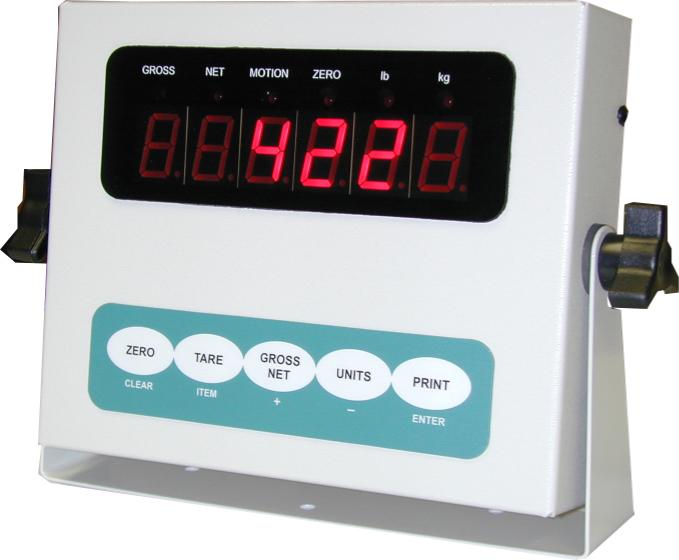
IDS 422
MULTI-FUNCTION INDICATOR
Download data sheet PDF format (218k)
PDF manual
Industrial Data Systems Inc., proudly introduces the addition of the new IDS 422 digital weight indicator to the 400 series indicator line.
PROGRAM MODES
The IDS 422 is preprogrammed with 10 different modes of operation to
accommodate most of the basic industrial scale applications.
The mode is selected and easily configured from the keyboard during initial setup. The
unit will operate in the mode selected until the user reconfigures it.
MODE 0: Push-button tare.
Used for basic gross or net mode weighing.
MODE 1 : Keyboard tare.
Allows the user to keyboard enter a tare weight which can be used for net weight
calculation.
MODE 2 : Accumulate
with Running Total.
Accumulate gross or net weights and maintain running total for job, lot, etc.
Calculates G,T,N, totals.
MODE 3 : Print
Weight With Subtotal and Total.
You can print the lot or job or lot subtotal whenever needed.
Totalized and clear at the end of the run.
MODE 4 : Manual (Axle) Weigh.
Push the PRINT button to sequentially number and print a series of
weighments. Push the TOTAL button to print and clear the total and reset the sequence
number.
MODE 5 : Automatic (Axle) weigh.
This mode operates similar to Mode 4 except printing is automatic when motion
settles. Traffic light control, trip level selection, and delay times for control
functions are provided.
MODE 6 : Automatic Axle weight On Long
Scales.
Weigh by axle on a truck scale. weight on the scale is automatically tared off
after each weihgment.Operation, controls and selections are the same as Mode 5.
MODE 7 : Peak Hold Mode.
Display and print the peak weight detected by the indicator in the gross or net
mode.
MODE 8 : Over / Under
Checkweigh.
Provides three TTL outputs and two setpoints. Outputs can be used with lights or
alarms to indicate weight on the scale is over, under, or between setpoint weights.
MODE 9 : Bulkweigh.
Features a setpoint with remote start / stop option and fill control relay
signal. Scale empty weight and draft weights are configurable. Use for multiple drafts
with total and subtotal printing.
COMMUNICATIONS
Serial Port 1:
................................. RS232 or 20ma current loop.
Serial Port 2: .................................
RS232 or RS485.
Digital Port: .................................
3 TTL inputs and 3 TTL outputs.
Input power option: 12 to 28 VDC.
Analog Output: Provides 4-20ma, 0-20ma, 0-24ma, 0-5v, 0-10v outputs with 16-bit resolution for process control. Relay Module: The relay module accommodates 3 optically-isolated input and or output, solid-state relays. Time and Date module: Y2K compliant clock.GENERAL SPEC.
Power: 120 VAC ±10%, 50/60 Hz or 10 to 28 VDC optional.
Power supply is mounted internally. Ligtning protection for load cell and AC input lines is
standard.
SCALE SPEC.
Display: ................................
1-inch x 6-digit numeric, 5-LED status
indicators.
Keyboard:
.......................... Sealed with tactile feel.
Display Graduations: ......... 200,000
industrial; 10,000 HB44.
Display increments: ........
1, 2, 5, 10, 20, 50.
Decimal Point: ..................
0 to 4 decimal places.
Internal Graduations: ........
1,024,000.
Conversation Rate: ........
60/sec. @ 60 HZ line frequency.
Signal Sensitivity: ...........
0.1 uV/grad (min).
Signal Range: ................... 0.5
mv/V to 6mv/V
Load Cell Excitation: .......
10 V
Load Cell Current: .........
240 ma with eight 350 ohm load cells.
Auto Zero Tracking: ......
0-60 grads @ 1/4 grad increments.
Auto Zero Delay: ............
0-25 sec. @ 0.1 sec. increments.
Linerization: .......................
5 point.
Digital Filter:
.................... Using advanced DSP algorithm.
Digital Calibration: .......
Features front panel calibratin. Zero
and
Span stored in EAROM.
Watchdog Timer: .........
Fault tolerant operation.